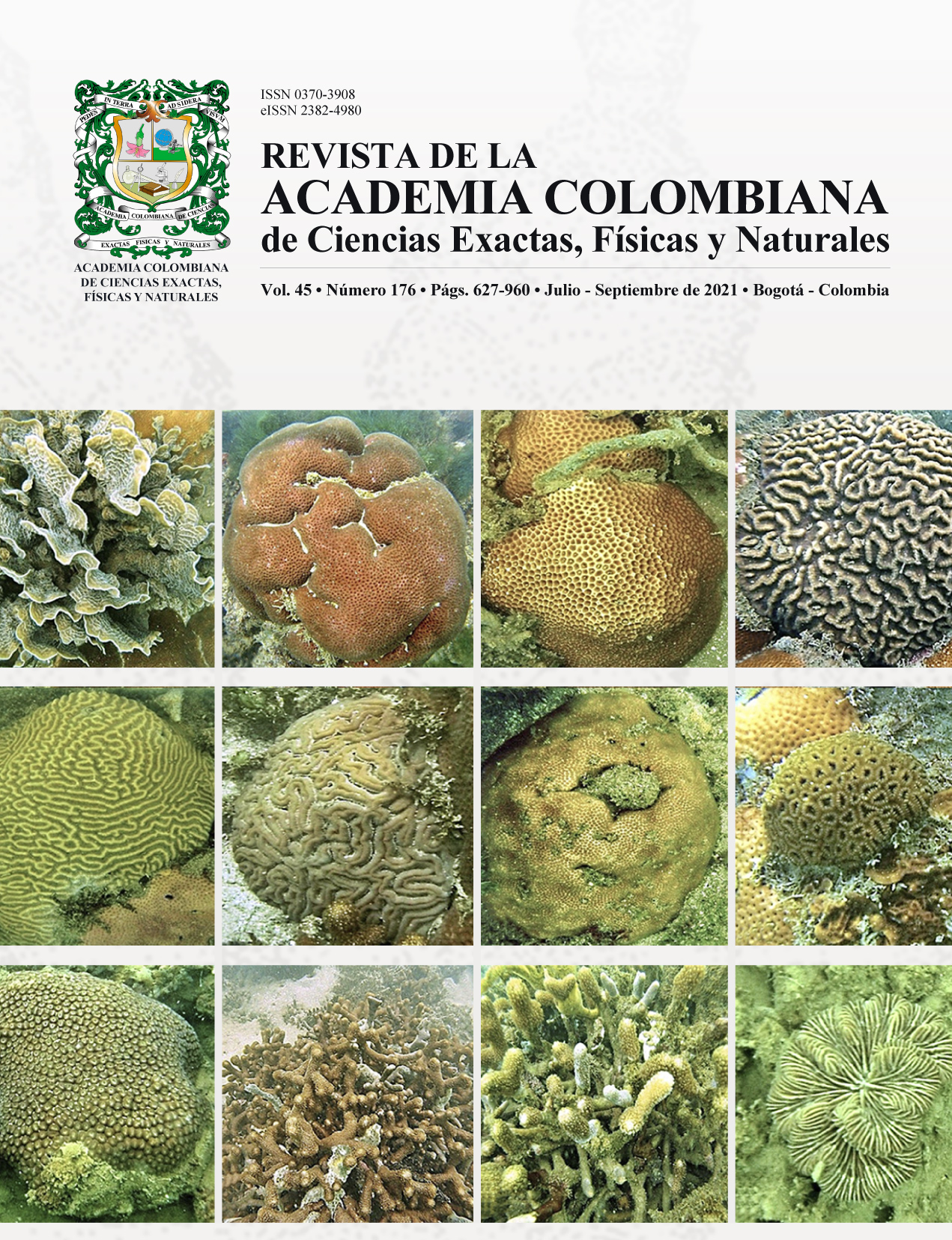Referencias
Armenteras, D., Schneider, L., Dávalos, L. M. (2019). Fires in protected areas reveal unforeseen costs of Colombian peace. Nature Ecology & Evolution. 3 (1): 20-23. Doi: 10.1038/s41559-018-0727-8
Benjamin, J., Rovere, A., Fontana, A., Furlani, S., Vacchi, M., Inglis, R. H., Gehrels, R. (2017). Late Quaternary sea-level changes and early human societies in the central and eastern Mediterranean Basin: An interdisciplinary review. Quaternary International. 449: 29-57. Doi: 10.1016/j.quaint.2017.06.025
Borremans, B., Faust, C., Manlove, K. R., Sokolow, S. H., Lloyd-Smith, J. O. (2019). Crossspecies pathogen spillover across ecosystem boundaries: Mechanisms and theory. Philosophical Transactions of the Royal Society B: Biological Sciences. 374 (1782): 20180344. Doi: 10.1098/rstb.2018.0344
Eakin, C. M., Morgan, J. A., Heron, S. F., Smith, T. B., Liu, G., Alvarez-Filip, L., Bouchon, C. (2010). Caribbean corals in crisis: Record thermal stress, bleaching, and mortality in 2005. PloS one. 5 (11): e13969.
Franco, A. L. C., Sobral, B. W., Silva, A. L. C., Wall, D. H. (2019). Amazonian deforestation and soil biodiversity. Conservation Biology. 33 (3): 590-600. Doi: 10.1111/cobi.13234
Gowdy, J. & Krall, L. (2014). Agriculture as a major evolutionary transition to human ultrasociality. Journal of Bioeconomics. 16 (2): 179-202. Doi: 10.1007/s10818-013-9156-6
Graesser, J., Aide, T. M., Grau, H. R., Ramankutty, N. (2015). Cropland/pastureland dynamics and the slowdown of deforestation in Latin America. Environmental Research Letters. 10 (3): 034017. Doi: 10.1088/1748-9326/10/3/034017
Henderson, K. & Loreau, M. (2018). How ecological feedbacks between human population and land cover influence sustainability. PLOS Computational Biology. 14 (8): e1006389. Doi: 10.1371/journal.pcbi.1006389
Henderson, K. & Loreau, M. (2019). An ecological theory of changing human population dynamics. People and Nature. 1 (1): 31-43. Doi: 10.1002/pan3.8
IPCC. (2021). Climate Change 2021: The Physical Science Basis. Contribution of Working Group I to the Sixth Assessment Report of the Intergovernmental Panel on Climate Change. MassonDelmotte, V., P. Zhai, A. Pirani, S. L. Connors, C. Péan, S. Berger, N. Caud, Y. Chen, L. Goldfarb, M. I. Gomis, M. Huang, K. Leitzell, E. Lonnoy, J. B. R. Matthews, T. K. Maycock, T. Waterfield, O. Yelekçi, R. Yu and B. Zhou (eds.). Cambridge University Press. En prensa
Keesing, F., Belden, L. K., Daszak, P., Dobson, A., Harvell, C. D., Holt, R. D., Ostfeld, R. S. (2010). Impacts of biodiversity on the emergence and transmission of infectious diseases. Nature. 468 (7324): 647-652. Doi: 10.1038/nature09575
Kennett, D. J., Breitenbach, S. F. M., Aquino, V. V., Asmerom, Y., Awe, J., Baldini, J. U. L., Haug, G. H. (2012). Development and Disintegration of Maya Political Systems in Response to Climate Change. Science. 338 (6108): 788-791. Doi: 10.1126/science.1226299
Kessler, M. K., Becker, D. J., Peel, A. J., Justice, N. V., Lunn, T., Crowley, D. E., Plowright, R. K. (2018). Changing resource landscapes and spillover of henipaviruses. Annals of the New York Academy of Sciences. 1429 (1): 78-99. Doi: 10.1111/nyas.13910
Lafuite, A.-S., de Mazancourt, C., Loreau, M. (2017). Delayed behavioural shifts undermine the sustainability of social–ecological systems. Proceedings of the Royal Society B: Biological Sciences. 284 (1868): 20171192. Doi: 10.1098/rspb.2017.1192
Lafuite, A.-S. & Loreau, M. (2017). Time-delayed biodiversity feedbacks and the sustainability of social-ecological systems. Ecological Modelling. 351: 96-108. Doi: 10.1016/j.ecolmodel.2017.02.022
Martin, G., Yáñez-Arenas, C., Plowright, R. K., Chen, C., Roberts, B., Skerratt, L. F. (2018). Hendra Virus Spillover is a Bimodal System Driven by Climatic Factors. EcoHealth. 15 (3): 526-542. Doi: 10.1007/s10393-017-1309-y
McMichael, L., Edson, D., Smith, C., Mayer, D., Smith, I., Kopp, S., Field, H. (2017). Physiological stress and Hendra virus in flying-foxes (Pteropus spp.), Australia. PLoS ONE. 12 (8). Doi: 10.1371/journal.pone.0182171
Mondragón, F. (2021) Ciclos del dióxido de carbono en la formación y utilización de combustibles fósiles y su efecto en el cambio climático. Rev. Acad. Colomb. Cienc. Ex. Fis. Nat. Doi: https://doi.org/10.18257/raccefyn.1364
Plowright, R. K., Parrish, C. R., McCallum, H., Hudson, P. J., Ko, A. I., Graham, A. L., LloydSmith, J. O. (2017). Pathways to zoonotic spillover. Nature Reviews Microbiology. 15 (8): 502-510. Doi: 10.1038/nrmicro.2017.45
Rockström, J., Steffen, W., Noone, K., Persson, Å., Chapin, F. S., Lambin, E. F., Foley, J. A. (2009). A safe operating space for humanity. Nature. 461 (7263): 472-475. Doi: 10.1038/461472a
Rohr, J. R., Barrett, C. B., Civitello, D. J., Craft, M. E., Delius, B., DeLeo, G. A., Tilman, D. (2019). Emerging human infectious diseases and the links to global food production. Nature Sustainability. 2 (6): 445-456. Doi: 10.1038/s41893-019-0293-3
Röös, E., Bajželj, B., Smith, P., Patel, M., Little, D., Garnett, T. (2017). Greedy or needy? Land use and climate impacts of food in 2050 under different livestock futures. Global Environmental Change. 47: 1-12. Doi: 10.1016/j.gloenvcha.2017.09.001
Salazar, F. Z. (2019). FARC and Deforestation in Colombia: A Case for Rebel Governance? Georgetown University. 31 pp.
Souza-Neto, J. A., Powell, J. R., Bonizzoni, M. (2019). Aedes aegypti vector competence studies: A review. Infection, Genetics and Evolution. 67: 191-209. doi: 10.1016/j.meegid.2018.11.009
Vorou, R. (2016). Zika virus, vectors, reservoirs, amplifying hosts, and their potential to spread worldwide: What we know and what we should investigate urgently. International Journal of Infectious Diseases. 48: 85-90. doi: 10.1016/j.ijid.2016.05.014

Esta obra está bajo una licencia internacional Creative Commons Atribución-NoComercial-SinDerivadas 4.0.
Derechos de autor 2021 Revista de la Academia Colombiana de Ciencias Exactas, Físicas y Naturales

